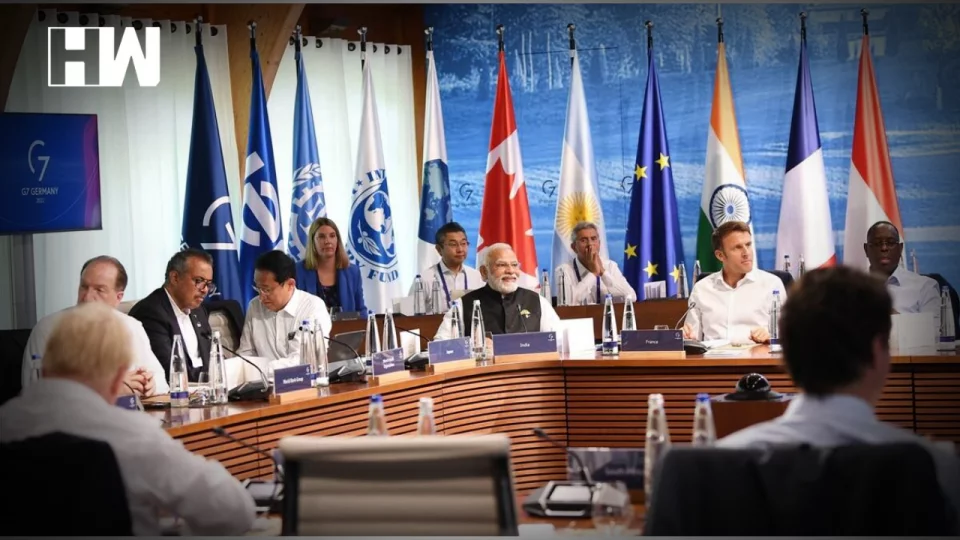The G7 highlighted in a joint declaration the significance of laws and regulation in place in each country to promote the ideals and values of ‘free speech’ in democracy.
Elmau, Germany: On Monday diplomats of the G7 countries met in Germany to issue global statements claiming that the nations seek to promote international order, acknowledge and respect the territories of other states, defend and respect the principles enshrined in the UN charter as they vowed to uphold their duty to protect the rule of law, human rights, and peace.
The joint statement issued by the G7, stressed the significance of the national rules and laws in place in each nation for advancing the values and ideals of democracy.
“We, the Leaders of Germany, Argentina, Canada, France, India, Indonesia, Italy, Japan, Senegal, South Africa, the UK, the US and the EU affirm our commitment to strengthening the resilience of our democracies and to working towards equitable, inclusive and sustainable solutions to global challenges, including climate change and the COVID-19 pandemic, and reaffirm our commitment to the rules-based international order,” it said.
The statement acknowledged the 2021 Carbis Bay Open Societies Declaration and recognised the “dramatic changes” in the geopolitical atmosphere ever since then and the rising threats to global democratic institutions.
“We remain steadfast in our commitment to defending peace, human rights, the rule of law, human security and gender equality, as recognised by international law, including the United Nations Charter, and call on our international partners to join us in these efforts,” the statement said.
“We hail all courageous defenders of democratic systems that stand against oppression and violence, and will step up international cooperation to improve the resilience of democratic societies globally.” it read.
“We commit to engage with partners internationally for peace and prosperity, and will work for progress towards an equitable world, because we are stronger together,” it said
The statement acquires significance in context of China’s aggressive moves in the strategically important Indo-Pacific area and Russia’s annexation of Ukraine.
In consideration of China’s muscular military actions in the region, India, the US, and various other heavyweights have been debating the importance of preserving a free, open, and affluent Indo-Pacific.
Taiwan, the Philippines, Brunei, Malaysia, and Vietnam all have territorial claims in the disputed South China Sea, while China claims a substantial portion of the area. In the South China Sea, Beijing has established military installations and artificial islands.
In the South China Sea, India is pursuing oil exploration projects in Vietnamese seas. In recent times, India and Vietnam have strengthened their marine military cooperation and intelligence operations to preserve shared interests.
“In sharing these values, we are stronger together and commit to supporting democracy worldwide and free and fair elections, including through electoral assistance; in the spirit of partnership fighting climate change, preventing environmental degradation and loss of biodiversity, mobilising climate finance and supporting a just, equitable and socially inclusive transformation agenda, ensuring an orderly fair and equitable energy transition, taking into account energy security, national development priorities, viable and affordable technologies,” the G7 said.
In advisory, it committed to partnering closely in the spur to the 27th Conference of the Parties to the United Nations Climate Change Conference (COP27), by improving food protection to avoid famine, seeking energy security and a reliable resilient energy supply chain.
Noting in this regard the UN Global Crisis Response Group initiative, pursuing concerted efforts to combat the COVID-19 pandemic, improving vaccine distribution and production, as well as pursuing other goals.
The G7 coalition proclaimed its passion and commitment to pushing for long-term debt relief, particularly within the G20 Common Framework for Debt Treatments beyond the Debt Service Suspension Initiative for desperate debtors, while constantly looking for additional solutions for Middle Income Countries, which are among the most vulnerable nations.
According to the declaration, the nations stated that they were committed to free and open public discussion to independent and pluralistic media, and the unrestrained sharing of information online and off, in a combined effort to encourage legitimacy, transparency, obligation, and responsibility both for citizens and elected officials.
“We are prepared to defend these principles and are resolved to protecting the freedom of expression and opinion online and offline and ensuring a free and independent media landscape through our work with relevant international initiatives; ensuring an open, free, global, interoperable, reliable and secure internet and increasing the cyber resilience of digital infrastructure, including by improving and sharing awareness of cyber threats and expanding cyber response cooperation,” it added.
As an independent media platform, we do not take advertisements from governments and corporate houses. It is you, our readers, who have supported us on our journey to do honest and unbiased journalism. Please contribute, so that we can continue to do the same in future.

